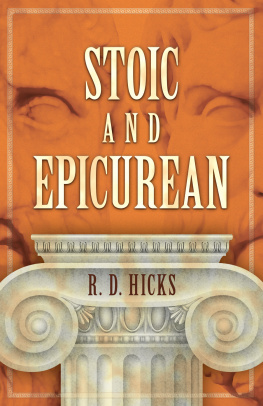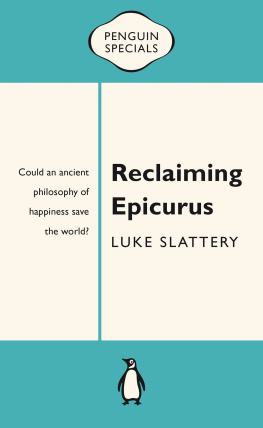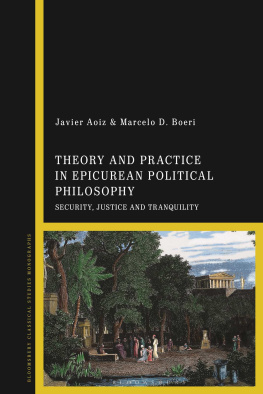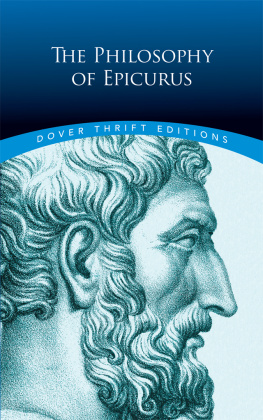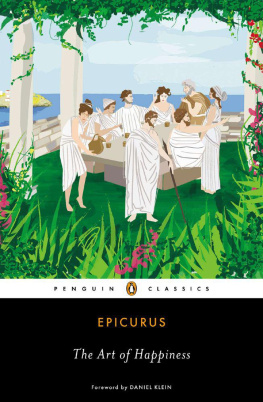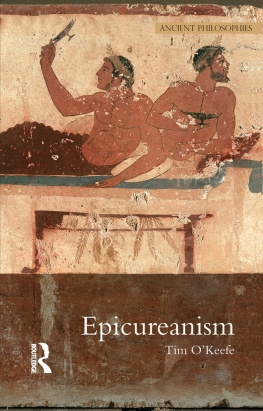Epicurus. - Stoic and Epicurean
Here you can read online Epicurus. - Stoic and Epicurean full text of the book (entire story) in english for free. Download pdf and epub, get meaning, cover and reviews about this ebook. City: Mineola;N.Y, year: 2019, publisher: Dover Publications, genre: Science. Description of the work, (preface) as well as reviews are available. Best literature library LitArk.com created for fans of good reading and offers a wide selection of genres:
Romance novel
Science fiction
Adventure
Detective
Science
History
Home and family
Prose
Art
Politics
Computer
Non-fiction
Religion
Business
Children
Humor
Choose a favorite category and find really read worthwhile books. Enjoy immersion in the world of imagination, feel the emotions of the characters or learn something new for yourself, make an fascinating discovery.
- Book:Stoic and Epicurean
- Author:
- Publisher:Dover Publications
- Genre:
- Year:2019
- City:Mineola;N.Y
- Rating:4 / 5
- Favourites:Add to favourites
- Your mark:
- 80
- 1
- 2
- 3
- 4
- 5
Stoic and Epicurean: summary, description and annotation
We offer to read an annotation, description, summary or preface (depends on what the author of the book "Stoic and Epicurean" wrote himself). If you haven't found the necessary information about the book — write in the comments, we will try to find it.
Stoic and Epicurean — read online for free the complete book (whole text) full work
Below is the text of the book, divided by pages. System saving the place of the last page read, allows you to conveniently read the book "Stoic and Epicurean" online for free, without having to search again every time where you left off. Put a bookmark, and you can go to the page where you finished reading at any time.
Font size:
Interval:
Bookmark:

Bibliographical Note
This Dover edition, first published in 2019, is an unabridged republication of the work originally published in the Epochs of Philosophy series by Russell & Russell, Inc., New York, in 1962, which was an unabridged republication of the work originally published by Longmans Green, London, in 1911.
International Standard Book Number
ISBN-13: 978-0-486-83260-9
ISBN-10: 0-486-83260-0
Manufactured in the United States by LSC Communications
83260001 2019
www.doverpublications.com

PREFACE
THE philosophical systems of Zeno and Epicurus may profitably be studied together. For, in spite of obvious differences, over which their adherents for centuries waged internecine warfare, it is easy to discern the fundamental similarity between them. Both schools sought by devious paths one and the same goal. Both exalted practice above theory, and conceded to sense and experience their full right. Both, in short, were crude forms of realism, which for the time (and not for that time alone) had come into its inheritance and held full sway over the minds of men. The temper of the age favoured such a reaction from extreme intellectualism. The success of the new schools, if not immediate, was assured from the first, reaching its height when Hellenistic culture was taken up by the practical Romans. My exposition of these two parallel systems of thought is primarily based on independent study of the original authorities. In this department of the history of philosophy much good work has been done in the last quarter of a century. I have made it my business to compare the results of recent investigation with the sources themselves, now rendered accessible, as they never have been before, through the labours of such competent scholars as Diels, Wachsmuth, Usener, and von Arnim. Even with these welcome aids, the task of research is by no means easy, owing to the scantiness and the peculiar nature of the materials which time has spared. To take the early Stoics, Zeno and Chrysippus; much of the evidence is derived from opponents who were naturally more alert to detect and expose inconsistencies than careful to state impartially the doctrines they impugned. When ampler means of information become available, new difficulties arise; for while it is certain that the Stoics of Cicero's time had diverged from the standards of orthodoxy prescribed by their predecessors, it is not equally certain wherein precisely this divergence consisted. Thus Cicero puts into the mouth of Cato a lucid exposition of Stoic ethics, but what particular Stoic was Cicero's authority, and how far this authority reproduced or modified the original doctrine of Zeno and Chrysippus, is matter of dispute. Nor are these difficulties removed by consulting Seneca, Epictetus and Marcus Aurelius, the authors whom we know at first hand and in fullest detail. It is difficult to see how, from a mass of precepts, exhortations and moral reflections the underlying structure of dogma can be inferred with such clearness and precision as readily to serve for comparison with other authorities. The most careful inquiry must, therefore, leave room for doubt, on questions of grave importance. In the first three chapters of this work the reader will find a nucleus of fact, well attested by documentary evidence, and my constant endeavour has been to bring him, wherever possible, face to face with the utterances of the Stoics themselves, so that he may judge for himself of the correctness of my interpretation.
In the fourth chapter I have followed substantially the same course, availing myself of the excellent versions of Epictetus and Marcus Aurelius by Long and Rendall. Seneca, on the other hand, though still popular in France, has with us of late fallen into neglect. Even of his epistles we have no standard translation, a fact which well deserves the attention of English and American scholars.
The rival school of Epicurus has been more fortunate. Not only have we the summaries of its founder, but the task of reconstruction is rendered comparatively easy by the poem of Lucretius, which the English reader can study for himself in the admirable prose version of H. A. J. Munro. Here, while reserving the right to form my own judgment from the evidence, I have, in the main, followed the guidance of Munro and Giussani. Some points of detail are obscure, but on the whole no ancient system is more easily comprehended or appraised. In my sixth chapter I have tried to render adequately one valuable Epicurean document, the letter to Herodotus, and occasional illustrations and parallels have been added to make its meaning clearer. In dealing with Epicurean theology in the seventh chapter, we quit the region of ascertained fact for dubious speculation and ingenious conjecture. Caution is therefore necessary, since the promised exploration of Herculaneum may some day bring to light the missing clue to this puzzling riddle.
Not the least noteworthy feature in these two philosophies is the long duration of their exclusive, if divided, supremacy. In the school of Epicurus there are no changes to record. Everything goes to show that the doctrine of the founder was guarded intact as he had left it. Even the genius of Lucretius did but enshrine it in an imperishable memorial. It was far otherwise with Stoicism, which provoked fierce opposition and was continually modified by pressure from without and within. No narrative of its rise and development would be complete which failed to take account of these conflicts. It has, therefore, been incumbent upon me to linger awhile over the adversaries and critics of the Stoics, to describe the successive phases of Academic Scepticism and Eclecticism, and above all, to emphasise the influence of Carneades. In this way the eighth and ninth chapters may be regarded as forming an integral portion of my plan. For the last chapter a similar excuse may be tendered. After permitting the other opponents of the Stoics to state their objections it would have been inconsistent to pass over nesidemus and not to allow Sextus Empiricus and the Pyrrhoneans to say the last word. For the use of students a select bibliography has been appended, as well as a chronological table of the more noteworthy thinkers and writers. A historical sketch ranging over five centuries stands in need of some such aid, if it be no more than the merest framework of names and dates.
The proprietors of the Encyclopdia Britannica have courteously granted me permission to use for my present purpose the article on Stoics, which I contributed to the Encyclopdia some twenty years ago. I gratefully acknowledge my obligations to Mrs. Adam for allowing me to include in this volume a verse translation of the Hymn of Cleanthes, which her husband, the late Dr. James Adam, had privately printed. I am further indebted to Prof. H. N. Gardiner for his kindness in reading through the proofs and suggesting various improvements.
CONTENTS
Zeno, Cleanthes, Chrysippus, 4; Cynics and Stoics, 9; influence of Heraclitus, 10; Cleanthes's Hymn to Zeus, 14; its religious fervour, 16; Stoic pantheism, whence derived, 18; body the sole reality, 22; yet instinct with energy, 24; cosmology: force and matter, how related, 26; universal intermingling of qualities, 28; cosmogony, 30; the cycle of finite existence perpetually repeated, 33; natural theology, 39; moral order of the world, 41; the existence of moral evil, 43; how regarded by Chrysippus, 44; and by Marcus Aurelius, 46.
The art of life at once practical and comprehensive, 54; logic, 55; new table of categories, 56; Lekton, the matter or content of predication, 58; nature of the soul, 60; its unity, 62; its diverse functions miscalled "parts," 63; theory of knowledge: preconceptions and general notions, 66; presentations to sense and the test of their truth, 69; knowledge a system of presentations to sense or to reason, 72.
Next pageFont size:
Interval:
Bookmark:
Similar books «Stoic and Epicurean»
Look at similar books to Stoic and Epicurean. We have selected literature similar in name and meaning in the hope of providing readers with more options to find new, interesting, not yet read works.
Discussion, reviews of the book Stoic and Epicurean and just readers' own opinions. Leave your comments, write what you think about the work, its meaning or the main characters. Specify what exactly you liked and what you didn't like, and why you think so.

